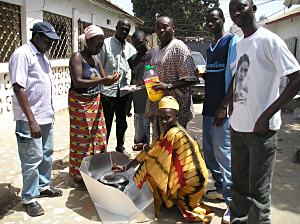
Workshop for Fresh Solar Cooking Technology
On April 6th 2005, Christine Danton, Program Director for Solar Household Energy (SHE), visited The Gambia for a one-week fact-finding and sensitisation mission. SHE is a US-based non-profit making organization that works with entrepreneurs and NGOs in the developing world to leverage solar cooking technology. This adds quality to life and relieve stress on the environment.
“One-third of the world’s population relies on fuel wood for cooking,” said Danton. “However, the costs of such usage are extremely high and unsustainable. Overuse can lead to rampant deforestation, economic hardship and acute health problems.” SHE’s latest innovation is the Hot Pot, based on a simple ‘panel’ oven designed by Dr. Roger Bernard and refined by engineers at the Florida Solar Energy Center and Energy Laboratories Inc. The Hot Pot is currently manufactured in Mexico and is priced at around 900 Dalasis.
 “In the Gambia, 97% of energy in The Gambia comes from wood. With the rapid expansion of urban population, huge pressure is being put on The Gambia’s forest resources. In ten years, there’s going to be no wood left in the Gambia. The Hot Pot solar cooker provides a long awaited alternative,” said Rodney Stubbing, Assistant Peace Corps Director.
“In the Gambia, 97% of energy in The Gambia comes from wood. With the rapid expansion of urban population, huge pressure is being put on The Gambia’s forest resources. In ten years, there’s going to be no wood left in the Gambia. The Hot Pot solar cooker provides a long awaited alternative,” said Rodney Stubbing, Assistant Peace Corps Director.
Indoor air pollution, caused through the inhalation of smoke from wood fires, was recently noted by the World Health Organization (WHO) as one of the largest threats to women in developing countries where respiratory diseases are common. The technology used with the Hot Pot effectively eliminates this problem.
SHE held a series of demonstrations between April 6th and April 11 in the Kombos with Peace Corps, one of their primary collaborators in the Gambia, as well as Concern Universal, Gambian Horticultural Enterprise (GHE), local businessmen and potential distributors.
“We are working to introduce the technology through trainings in order to allow people to decide if the HotPot is appropriate for their needs. If there is a demand for this technology in theGambia, we would like to work with local businessmen and help them import, market and sell the HotPots,” said Danton. Recent trials in the Gambia demonstrated how many popular foods can easily be cooked using the Hot Pot. In one-to-two hours, soups, sauces, eggs, rice, fish, and vegetables can be cooked while potatoes, chicken, meats, stews and bread are usually ready within three-to-four hours. Peace Corps is planning on holding additional demonstrations to encourage distributors to import the HotPots into the Gambia.” Solar energy is free, preserving users’ limited financial resources,” stated Stubina. “The time women must devote to foraging firewood can be spent more productively while reducing dependence on dwindling forest resources and halting environmental degradation.”



